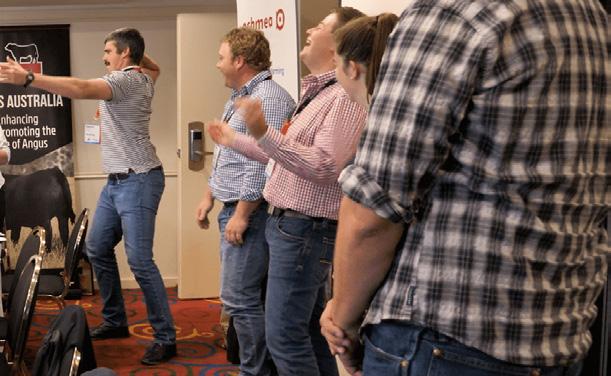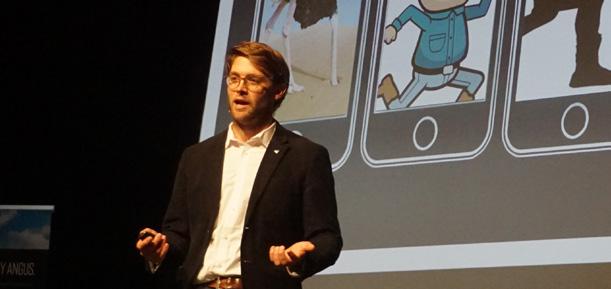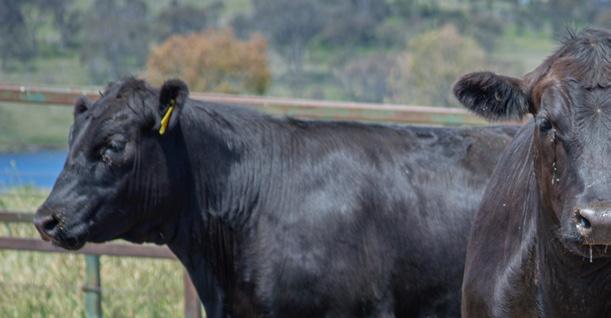
13 minute read
Behind the Beef - The Lessons You Learn with Angus Street
Cheyne Twist, Senior Marketing & Communications Officer
This episode we had the pleasure of sitting down with AuctionsPlus Chief Executive Officer Angus Street.
Angus has extensive experience with technology systems which require a deep understanding of critical business drivers in multiple markets and industries, opening of new markets through strong sales and trade marketing, as well as growing businesses through innovation, process improvement and transformational technologies. As CEO of AuctionsPlus, Angus is focused on taking the $2.3 billion GMS business to the next level. Angus wants to add value right along the supply chain and sees online marketplaces as a key enabler of success. Passionate about helping businesses evolve to stay ahead of the pack through the use of digital technology, Angus believes that with a little country music, genuine conversations and a motto of ‘the sum of us beats the one of us’ we can shape the future of the Ag sector. Angus joined us to speak about his role within AuctionsPlus, how he came to be where he is today in his career and some advice for young people in the industry. Angus, thank you for joining us for the podcast today. For those who are not familiar, what’s your role within your business and what is the role of your company in the ag industry? If you could give us a little background on yourself and who you are. Firstly, thanks for having me. It’s always a pleasure to be catching up with industry people, especially after two years being locked down in COVID. I’m the CEO of AuctionsPlus, an online trading platform, and we are essentially the digital market for all things ag. Someone once said to me, if you meet somebody on the Sydney train system, how would you describe AuctionsPlus? And I guess we see it as almost Amazon for agriculture, but in Australia. So, it’s an interesting story, AuctionsPlus. A lot of people think that it’s an ag tech start-up that had a boom period over the last five to ten years, but in actual fact, AuctionsPlus has been around for 36 years, and it was, I believe, kind of the original ag tech story. It was funded out of MLA through a grant and essentially these mad and crazy and completely innovative innovators wanted to trade livestock electronically. And I think what a lot of people don’t realise is that when you do the math, back 36 years ago is actually pre-internet so it wasn’t even trading livestock online. The first sale was done with the two way, a couple of kilometres of telephone wire and a fax machine, so they really kind of bootstrapped it for a number of years and then it’s been commercialised for the last 26 years. I’ve been really fortunate to be working with a team that has evolved the business over the last four to five years and we’re now not just recognised as a livestock platform, but we do everything from used farm machinery, seedstock sales, so we do a lot of stud cattle, stud sheep sales, alpacas, working dogs, this week we’ve got a camel auction and now real estate, water - I guess for any of the ag commodities that are looking to maximise their audience and their competition, we’ve got a platform that we can work on with those industries. I imagine in the last couple of years, with everything having to go online, it’s been quite an interesting period for you guys and quite busy. Look, I think COVID-19, without a doubt, has changed how businesses operate and how society kind of works and the environments that we find ourselves doing business in and connecting as people. So, AuctionsPlus was on the right side of COVID. That’s not to say that there are a number of businesses in ag, but also the wider community that had negative impacts from COVID. So, we don’t take away from that. But what we do is we feel pretty fortunate to have been able to provide the ag sector with a platform where they could do business as usual. Business continuity plans right through from farmers to agents to retail companies to you name it, we were able to work with those industries and support them through COVID. The outcome of all of that, because we’re definitely seeing the normalising of the COVID-19 impact on our business, is that there’s kind of a steadying of the market, a normalisation of activity in the market. So, I think for us now just around as much as it’s about growth and offering services and auction platforms, it’s around consolidation and ensuring that we support and provide exceptional services to the customers that we’ve grown with over the last two years. I guess it also helps modernise a lot of people that may have been a little hesitant to go into the online space as well. Not pushed people, but it gave them that extra support in that area that they could continue their business as sort of usual. Definitely. The science says that as humans, we fear change, that our natural instinct to change is fear. So, people then either change because they’re forced to or because things are good and they’re willing to take the risk, that the return versus risk profile is good enough for them to take the risk.
Behind the Beef
The last two years has been the perfect storm for digital agriculture and ag tech in general. Reason being is obviously we’ve had good seasons, so productivity and profitability is up. That means that producers and the agribusiness sector are in a mindset where they’re more willing to take a risk, the outlook is good, so they’re in a positive head space and they’ve got confidence in the sector. And then secondly, I guess COVID-19 forced people. They still had obviously the choice to send them to the sale yards and send them direct to the meat works and to feedlots which still occurs, but I think what it does is it opens up the consideration piece. It’s been a really positive change, I wouldn’t say just for our business, but I’d say for all of agriculture. What was your career journey to get to this point in your career? It’s a good journey, I wouldn’t say it’s been perfect, I’d say it’s probably been a little bit imperfect. My mum and dad have got a property in northern New South Wales just outside of Scone where I grew up as a kid and I’m fortunate that they’ve still got that and we can go back there and I can take my kids back there and give them the same kind of experience that I had growing up, which is lovely. I kind of had a couple of stumbles at university and I got kicked out of my first uni and then found a really good place up in Queensland. I finished with a journalism degree, and I just loved the storytelling aspects of the job. The journalism industry went through massive change during the GFC. I lost my job there through redundancies and then I wanted to get back to agriculture - I just loved it. I’d studied ag science and I failed at ag science, but I really missed the ag piece. And so, a job came up at MLA (Meat & Livestock Australia) and I was there for a couple of years doing marketing, communications, stakeholder relations and then went into funds management. Then I went and studied my MBA and I guess that was a bit of a turning point for me because I was starting to be pigeonholed as the communications and marketing guy and for me that’s a really important skill, but I wanted to expand my knowledge and my skill set because I believed I had stuff to offer. So, I went and did an MBA and I studied for six months in Shanghai, which was an experience. I proposed to my now wife and then two weeks later I took off and headed to Shanghai for six to eight months, came back a month before our wedding. I’m really fortunate to have my wife along for the journey and supporting me. Then I started two businesses - both those businesses failed - and I found myself at AuctionsPlus and I guess the rest is history. I started there as the sales and marketing manager and then I was given the privilege to lead the company and, geez, what a privilege it’s been. I was going to ask what advice you give someone pursuing a career path similar to yours but because yours has been a bit winding, I guess what’s the best advice that you’ve been given with regards to your career? I think one is you don’t know everything, and I think as we progress through life and our careers, you sit there and feel like you’ve got to know everything, but in actual fact, knowing everything or pretending to know everything is actually a detriment to you. I guess the flip side to not knowing everything is actually get curious, ask lots of questions, and do that from a networking point of view and do that in your job. The person who asks lots of really curious and genuine questions is quite often the person that not only understands what’s happening in their sandbox but understands the entire sandbox and how all of the pieces fit together. The second thing is to get comfortable in your own skin, and that’s taken me a long time, and it’s something I still struggle with, but I think it’s getting comfortable in your own skin and working out your purpose and what drives and motivates you. So often we kind of float through life, either our careers or just life in general, with other people’s expectations on us. I guess we’ve got to challenge the story that we’re telling ourselves, which is, what are actually my core beliefs? Are they my values? I think doing the work to work out your values and your why, what gets you out of bed in the morning, why do you exist? What impact do you want to have in the world? What’s the legacy you want to leave?

A good question someone said to me is and it’s a bit morbid, but it’s a really good question - when somebody stands up at your funeral what do you want them to say about you? ‘Oh, gee he was a great strategic thinker’, or ‘gee he played good footy’, or ‘he was caring, he was honest, he was brave, he was compassionate, he was genuine’. What words do you want people to describe you by? I guess defining those will help you make life decisions. That would be my two. What would you say was the biggest challenge of your career so far, and how did you overcome that? I think there’s probably there’s two big challenges, and I will talk to the one at AuctionsPlus, which is the most recent. It’s March 2020, I think it was two Fridays after Scott Morrison had come out and said, ‘There’s a global pandemic, we’re shutting Australia down’. You know, his big speech on Sunday, which everybody remembers. So obviously, businesses went into panic - What does this mean? How do we operate? You get people out of the office and you kind of go through the processes. We did that, which was wonderful, and we moved people home, but it also meant a lot of school kids were sent home and that kind of stress on the bandwidth of Telstra and the connectivity in Australia for that first month of COVID, I would say there was a fair bit of pressure on the connectivity systems. So, take that as one element. The second element is we had our biggest number of listings ever on a Friday. I think we had 30,000 lots, we had five sales and it had been raining for like, three weeks across the eastern seaboard, so everybody was restocking. It was just madness. So, our biggest Friday yet of listings, the greatest number of people who’ve been on the website, the most connected users. The perfect storm. Yes, the perfect storm. I got an email on Thursday night from Microsoft Azure who’s our server and it says, ‘Dear Client, please be advised that due to the global pandemic, you may experience a reduction in your bandwidth. We are prioritising essential services’. I kind of read it and was like, okay cool. I spoke to our CTO and said, what does this mean? And he said, look, we can’t do much about it. Friday rolled around and at about 10:00am, the system gets a bit shaky. And put it this way, we finished our last auction at about 6.00pm on Friday night and it’s etched in my memory as kind of a Black Friday event. It’s etched in a lot of our customer service people and in minds of a lot of the staff. At the time our phones lit up. People were like, is the auction stopped? Are we in? Are we out? So, it was just an absolute kind of ‘bleep’ storm. There at that moment it was like, we got through it. You could see the stress on everybody’s faces. I took myself off into the boardroom and was like, now we’ve got over the hump and we’ve delivered on it and all of the data said that nobody was impacted. It just was super stressful. But now was the time that the work actually began. You just had one of those days where it felt that the world was ending and it felt like that for us, I know that sounds dramatic. But then the work began. Firstly, we had to front up to our customers and talk them through what happened and be really open and honest with where we were at as a business and what that meant. Saturday morning was a crisis meeting where we had our CTO in there, and it was that essentially we had gone from having this great upward trajectory where everyone was cheering positively because it had been a tough couple of years for us as a business, and then all of a sudden, it was like we fell off a cliff. I think that day was one of the toughest, but it was also one of the greatest learnings around how you can bring a team together. I was about to say, teamwide it would have been a massive learning curve, but also meant really banding together and getting really it done. And I think that’s what happens in business, right? You go through tough times. You talk about people who have been impacted by floods, by bushfires, and it is the Aussie way to band together and to make it work. It was a real kind of sense of unity at the end of it. You are spending time this afternoon talking to the people that are taking part in the 2022 GenAngus Future Leaders Program. Tell me, what’s the most rewarding part about presenting in forums like this, where you’re in front of a room full of young people in the industry that you’re passionate about? What’s the best part of doing something like that? Look, firstly, I acknowledge I’m pretty nervous. I think anytime anybody presents, you have probably got to be a little bit nervous because as someone once said to me, it’s because it means something to you. And I guess I don’t feel that at the time. It’s like, yeah, that’s nice advice, but right now is not the time.












